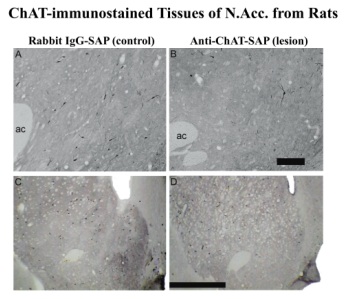Selective Cholinergic Depletion of Pedunculopontine Tegmental Nucleus Aggravates Freezing of Gait in Parkinsonian Rats. Xiao, H, Li, M, Cai, J, et al. (2017). Neurosci Lett [Epub 10 August 2017]. PMID: 28803956
Many patients with advanced Parkinson’s disease suffer from gait and postural impairments. The authors used Anti-ChAT-SAP (Cat. #IT-42) to specifically lesion neurons in the Pedunculopontine Tegmental Nucleus (PPTg) to examine the impact on gait performance. Adult male rats received either unilateral PPTg cholinergic lesion or bilateral PPTg lesion, at a dose of 250 ng. The authors conclude that the cholinergic neurons of pedunculopontine tegmental nucleus play a vital role in the occurrence of gait freezing in Parkinson’s disease.
Also see: Impairments in gait, posture and complex movement control in rats modeling the multi-system, cholinergic-dopaminergic losses in Parkinson’s Disease.
Aaron Kucinski. Targeting Trends (2015)

Choline acetyltransferase (ChAT) catalyzes the synthesis of the neurotransmitter acetylcholine (ACh) from choline and acetyl-CoA in cholinergic neurons. ChAT serves as a specific marker for cholinergic neurons in both peripheral and central nervous systems. Dysfunction of cholinergic neurons underlies aspects of clinical symptoms found in neurological and psychiatric disorders such as Alzheimer’s disease, Down and Rett syndromes.
Anti-ChAT-SAP specifically eliminates cells that express choline acetyltransferase.
